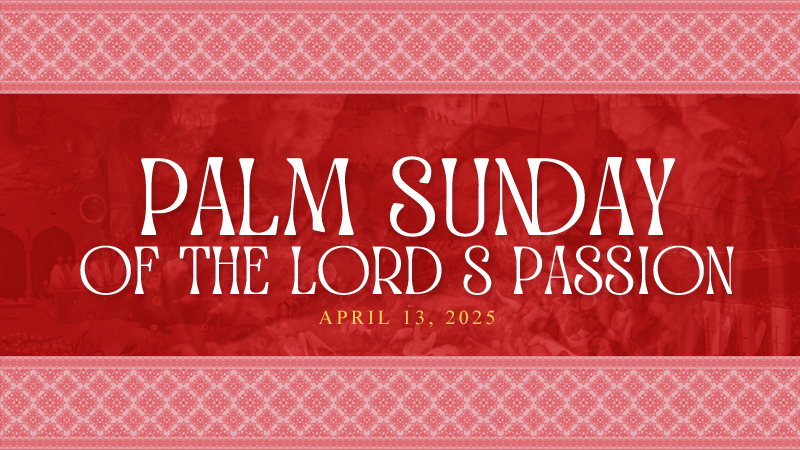SUNDAY REFLECTIONS | Palm Sunday of the Lord’s Passion
By Social Communications
Published on April 13, 2025
Philippians 2:6–11 — “He humbled himself, becoming obedient to death… Therefore God greatly exalted him.”
Palm Sunday is a unique and deeply moving day in the life of the Church. At the beginning of Mass, we join the crowds waving palms and singing “Hosanna” as Jesus enters Jerusalem in triumph. But by the end of the liturgy, we have heard the full Passion narrative: betrayal, suffering, crucifixion, and death. The contrast is striking. Palm Sunday draws us into the mystery of Christ’s love—a love that embraces both the joy of the crowd and the agony of the cross.
In the Second Reading for this Sunday, taken from Philippians 2:6–11, St. Paul gives us one of the most beautiful and powerful reflections in all of Scripture. It is often called the “Christ Hymn,” and it tells us who Jesus is and what He has done for us—not just in events, but in meaning. It takes us to the very heart of Holy Week.
St. Paul writes, “Though he was in the form of God, Jesus did not regard equality with God something to be grasped.” This tells us a great truth: Jesus is God from all eternity, equal to the Father. But rather than cling to His divine status, He chose to empty Himself. He did not stop being God, but He freely laid aside the glory and privileges of divinity to come among us as a servant.
This is the mystery of the Incarnation—God becoming man not to be served, but to serve. Christ took on “the form of a slave,” humbling Himself to share in our human weakness. He became like us in all things but sin. And His humility did not stop there. St. Paul continues: “He humbled himself, becoming obedient to death, even death on a cross.”
This is the center of the Passion. Jesus did not suffer as a victim of fate or violence. He chose the cross. He obeyed the Father’s will, not out of fear, but out of love—for the Father, and for us. The cross was the ultimate act of love, where the Son of God gave everything, holding nothing back. And not just any death, but death by crucifixion—a form of execution reserved for the lowest criminals, full of shame and agony.
Why would God do this? The answer is simple, yet overwhelming: to save us. Jesus embraced the depths of human suffering so that no one would be beyond the reach of His mercy. In His Passion, He took on the weight of sin, not His own, but ours. He allowed Himself to be rejected, mocked, and killed, so that we might be forgiven, healed, and restored to life.
But the hymn does not end in death. It continues: “Because of this, God greatly exalted him and bestowed on him the name that is above every name.” The Resurrection and the Ascension are not afterthoughts—they are the result of Jesus’ loving obedience. Because He humbled Himself completely, the Father raised Him in glory. He is now the Risen Lord, seated at the right hand of the Father, and His name—Jesus—is above all names.
St. Paul says that “at the name of Jesus every knee should bend… and every tongue confess that Jesus Christ is Lord.” These words remind us of the future, when Christ will come again and every creature will acknowledge His kingship. But they also call us to respond now. To bend the knee is to adore, to worship, to submit. To confess Him as Lord is to recognize Him as the center of our lives, not just with our mouths, but with our hearts and actions.
So what does this mean for us as we enter Holy Week?
First, it means we are called to follow Jesus in the path of humility and love. Palm Sunday is not just about admiring what Jesus did for us—it is about joining Him. He emptied Himself, so we must empty ourselves of pride, selfishness, and attachment to sin. He obeyed the Father’s will, so we must seek and surrender to God’s will in our own lives, even when it is difficult.
Second, it means we are invited to walk through this week not as spectators, but as disciples. We do not rush ahead to Easter. We walk with Jesus through Holy Thursday, when He gives us the Eucharist. We kneel with Him in the Garden of Gethsemane. We stand at the foot of the cross on Good Friday. And we wait with hope at the tomb, trusting in the promise of resurrection.
Finally, Philippians 2:6–11 reminds us that the Christian life is always marked by this rhythm of humility and exaltation, death and resurrection. If we unite our sufferings to Christ, if we love as He loves, if we die to sin and live for God, we too will be lifted up. We will share in His victory. Not just one day in heaven, but even now, in the quiet joy of a life lived in grace.
Let us then enter Holy Week with reverence, gratitude, and a desire to be changed. The One who humbled Himself for our sake now invites us to humble ourselves in return—to open our hearts, to take up our cross, and to follow Him, trusting that the path of the cross always leads to the joy of the resurrection.
Hosanna to the Son of David! Blessed is He who comes in the name of the Lord.



